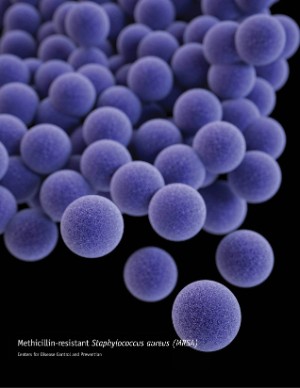LENS Health and Wellness
Beating Bacteria at Their Own Game
Developing a Drug to Prevent and Treat Deadly Infections
 IMAGE: Centers for Disease Control and Prevention
IMAGE: Centers for Disease Control and PreventionThis illustration shows a 3-D, computer-generated image of MRSA bacteria, which causes a range of illnesses, including pneumonia and bloodstream infections that can lead to sepsis and death. MRSA is resistant to many antibiotics.
Virulent bacterial superbugs are a nightmare. Even if antibiotics can wipe out 99.99 percent of the bacteria from a patient, the remaining 0.01 percent can mutate and become resistant to antibiotics. And, because bacteria can reproduce every 20 minutes, they can spread throughout the body—and to patients beyond.
"Antibiotics are only good for a certain amount of time and then bacteria don't care anymore," said Menachem Shoham, PhD, associate professor of biochemistry at the School of Medicine at Case Western Reserve. When bacteria become resistant to the weapons built to destroy them, bacterial infections such as methicillin-resistant Staphylococcus aureus (MRSA) rise and become deadly.
Shoham aims to end that kind of drug resistance with a new small-molecule anti-virulence technology he's developed. Known as F19, it doesn't kill bacteria, but rather disarms them of disease-causing toxins and virulence factors.
F19 could be used to prevent infection. Giving it to dialysis patients, for example, could potentially preempt infections before they start. F19 also appears to sensitize bacteria to low doses of antibiotics. As a result, it might be capable of restoring the destructive power of old antibiotics—even penicillin. And the drug could be delivered as a pill, an injection or topically.
That would be a game-changer at a time when antibiotic resistance is so deadly. The Centers for Disease Control and Prevention has estimated that more than 2 million people develop antibiotic-resistant infections annually and at least 23,000 die as a direct result of the infections.
To continue development of F19, Shoham co-founded Q2 Pharma Ltd., an Israeli biopharmaceutical company. It has entered into an exclusive licensing agreement with the university to commercialize F19. The company is now completing a rst round of funding and aims to start clinical trials in two years. If all goes well, Q2 hopes to be making a dent in antibiotic resistance in the early to mid-2020s.





